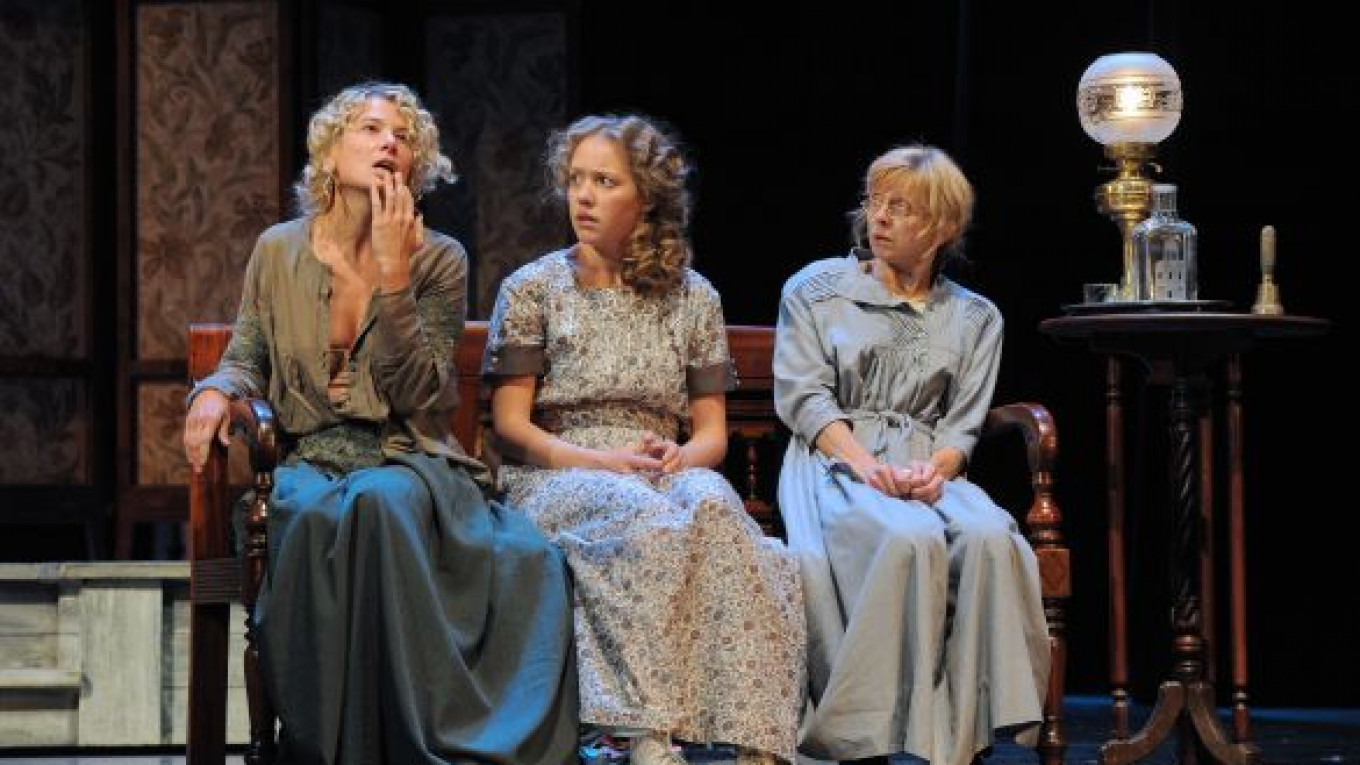Andrei Konchalovsky is best known for his work in film, but in recent years he has taken several forays into theater.
He has been especially loyal to Anton Chekhov. With "Three Sisters" at the Mossoviet Theater, he has now staged three of the great writer's four major plays. Only "The Cherry Orchard" is left and I suspect we will see that before long.
Previously in "The Seagull" (2004) and "Uncle Vanya" (2009) Konchalovsky beautifully merged a hyper-traditional style with clear and quirky elements of innovation. At its best, as in "Uncle Vanya," which remains in repertory at the Mossoviet, this truly can be refreshing. Konchalovsky's is a subtle, but powerful approach that deeply satisfies the traditionalist in you while heartily engaging that part of you that wants artists to take chances.
I saw that combination falter in "Three Sisters," Chekhov's tale about a family whose dream of escaping a deadening life in the provinces is completely out of reach.
Konchalovsky's own set design clings to what he devised for "Uncle Vanya" — a medium-sized platform at center stage that makes every performer step onto a stage twice before he or she performs. It is a quiet but constant reminder that we are in a theater watching a calculated performance, not a slice of real life.
Also, as in the past, the director uses cinematic devices to pull us out of the usual theatrical mindset. Some scene transitions are accompanied by real-life interviews with the actors projected on a huge screen over the stage. The monologues include serious thoughts about the actors' characters and some tomfoolery.
As it turns out, these filmed scenes provide the most convincing, interesting and revealing moments of the performance. Many of the actors who worked brilliantly with Konchalovsky in the past seem tired here.
Alexander Domogarov, whose brilliant, drunken Astrov in "Uncle Vanya" I will not forget soon, is a weak and squeaky Vershinin in "Three Sisters." Larisa Kuznetsova's schoolmarmish Olga, the oldest sister, clearly more smitten with Vershinin than the middle sibling Masha (Yulia Vysotskaya), who is a bundle of gawky mannerisms. As the sisters' ineffectual brother Andrei, Alexei Grishin succeeds in being almost invisible, something I have never seen him do in previous Konchalovsky productions.
Konchalovsky seems to have purposefully sabotaged the relationship between Masha and Vershinin. The customary interpretation of these two is that they are grasping at the last straws of youth and passion. Here, however, Vershinin is a finicky, unlovable buffoon who laughs when news comes about his wife's latest suicide attempt, while Masha, justifiably, doesn't have much interest in him.
It's not the unorthodox interpretation that raises questions, but the fact that little is offered to replace the tension that is lost.
The casting of the great Lithuanian actor Vladas Bagdonas as the cynical Doctor Chebutykin, who loved the sisters' mother but cannot remember if she loved him, promises more than it delivers. Bagdonas is larger-than-life and intriguingly cantankerous, as we might expect. But there is precious little connection between him and the rest of the cast.
In one of the nicer moments, Konchalovsky completely breaks ranks with tradition in his interpretation of Solyony (Vitaly Kishchenko) and Von Tuzenbach (Pavel Derevyanko), the two officers who compete for the affections of the youngest sister Irina (Galina Bob). Here they are great friends who constantly share laughs and tease one another. Their falling-out is swift and as unexpected as anything can be in a play the world has known well for over a century.
Konchalovsky surely aimed for a strong sense of comedy. Olga, Vershinin, Solyony and Von Tuzenbach are all played for laughs, regardless of the tragic reality that embraces them all to one extent or another. Some secondary figures emerge as straight-out clowns. But the result I saw was not so much comic as it was fitful and awkward.
With the actors dressed in costumes created by the masterful Rustam Khamdamov, this show is as attractive as anything Konchalovsky ever does. And there are definitely moments to cherish.
Alexander Lenkov's eccentric night watchman Ferapont is a sheer delight. Natalia Vdovina's subtly cloying performance of Andrei's wife walks a fine line that leans closer to naivete than to rapaciousness.
This "Three Sisters" is always pleasant to look at but it does not hold up the promise established by Konchalovsky's earlier forays into Chekhov. You want more from this director and this writer. For now, however, the place to find that is in "Uncle Vanya."
"Three Sisters" (Tri Sestry) plays Thursday and April 24 at 7 p.m. at the Mossoviet Theater, located at 16 Bolshaya Sadovaya Ulitsa. Metro Mayakovskaya. Phone: +7 495-699-2035. Running time: 3 hours, 30 minutes.
Contact the author at jfreedman@imedia.ru
Related articles:
A Message from The Moscow Times:
Dear readers,
We are facing unprecedented challenges. Russia's Prosecutor General's Office has designated The Moscow Times as an "undesirable" organization, criminalizing our work and putting our staff at risk of prosecution. This follows our earlier unjust labeling as a "foreign agent."
These actions are direct attempts to silence independent journalism in Russia. The authorities claim our work "discredits the decisions of the Russian leadership." We see things differently: we strive to provide accurate, unbiased reporting on Russia.
We, the journalists of The Moscow Times, refuse to be silenced. But to continue our work, we need your help.
Your support, no matter how small, makes a world of difference. If you can, please support us monthly starting from just $2. It's quick to set up, and every contribution makes a significant impact.
By supporting The Moscow Times, you're defending open, independent journalism in the face of repression. Thank you for standing with us.
Remind me later.


